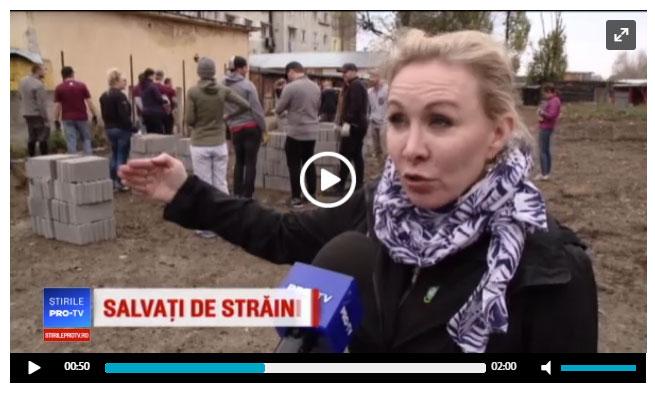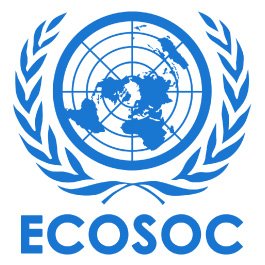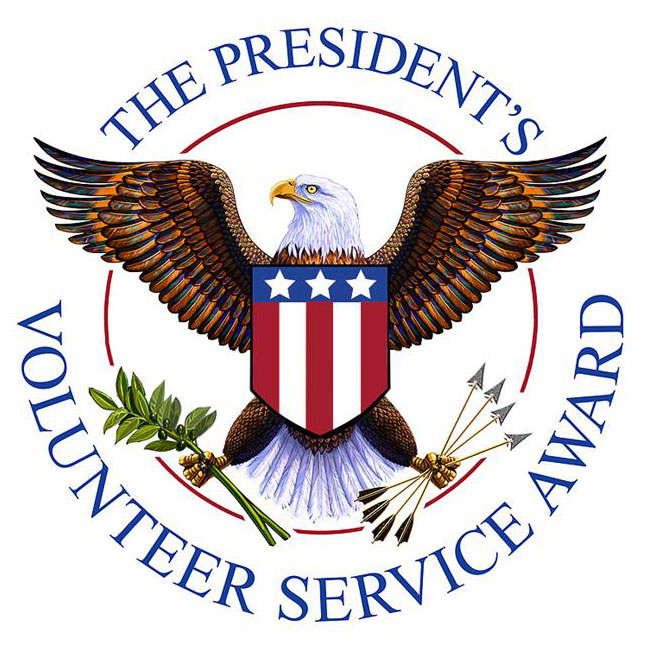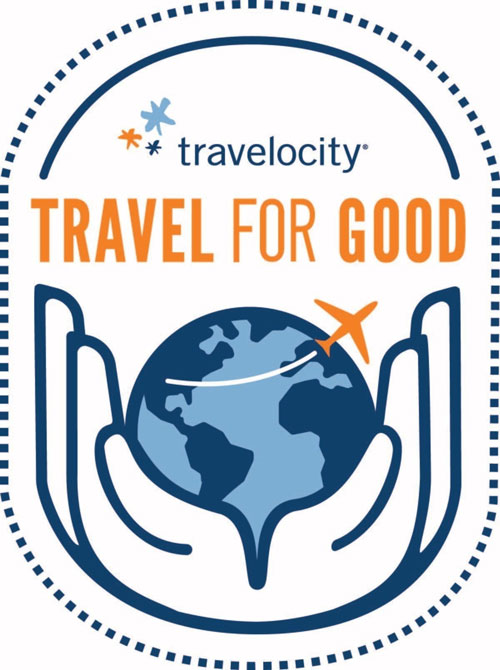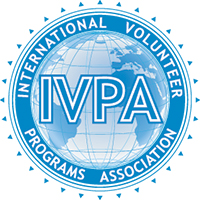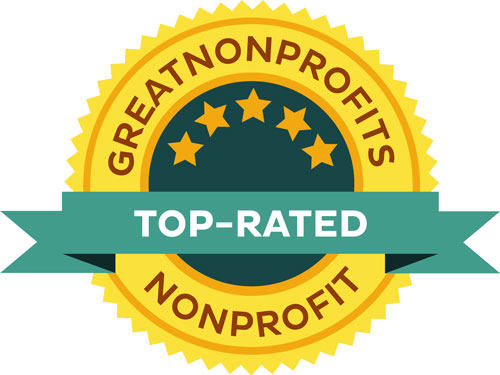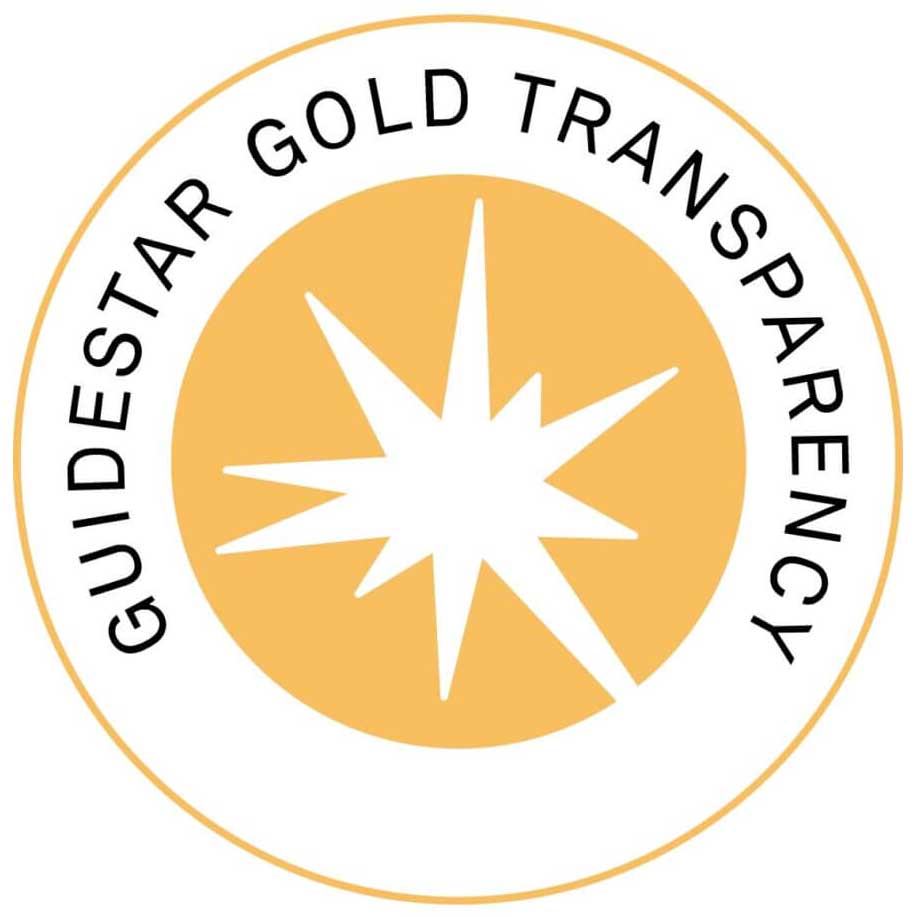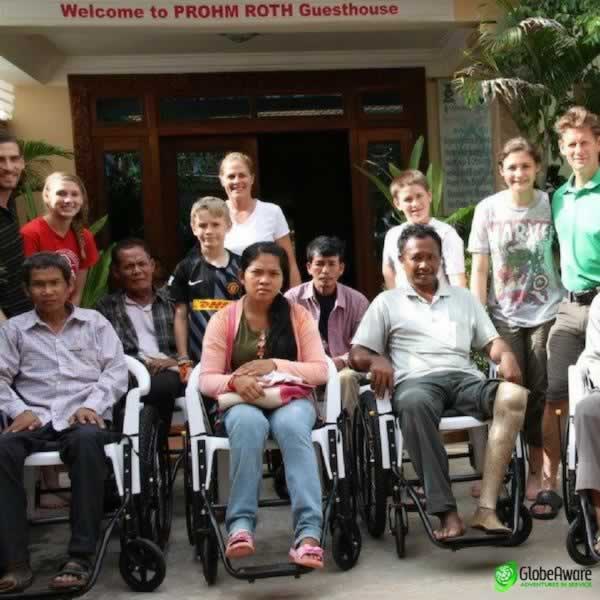
Globe Aware Trip to Cambodia: The Impact of Volunteering for a Family
- Source: Globe Aware
A family’s week-long volunteer vacation in Cambodia harvested a new global perspective for their four children, ages 10-17.
For their volunteer project the Vlaisimsky family spent time building a well for the community, assembling and distributing wheel chairs to landmine victims, and teaching English at a local non-governmental organization providing schooling for disadvantaged children in Siam Reap. It was during their time at the school that the family became intimately acquainted with the richness and reality of the Cambodian culture.

Voluntourism - Your Ticket to Cuba
- Source: Pink Magazine
Story and Photography by Donne Paine
I believe hurdles in life are meant to be jumped over are and not obstacles to stop us.
When initial plans to vacation in Cuba were derailed by hurricane Irma, my heart was broken but not my spirit. I had to find another way to get to this island, which sits only 90 miles off the coast of Miami.
Enter Globe Aware, a non-governmental organization (NGO) with volunteer programs in 17 third world countries. They are a “voluntourism” group—a mixture of volunteering and touring. Initially waitlisted, I joined a group of four in December for a week, and had an experience not to be forgotten.
Cuba is much more than classic cars and cigars. It is a country full of pride, friendly people, salsa music on every corner and ingenuity to be admired.
There has never been a more exciting time to take part in volunteer travel to Cuba! I was enchanted with a world unlike any I could imagine. Music abounded in the streets, there was hardly any traffic and smiles were everywhere. The embargo has meant severely restricted commerce and access to affordable food, but it has also preserved and insulated a culture unique in the world.
Globe Aware’s mission is to promote cultural awareness and sustainability. The eco-agricultural project our group was involved in was building a terraced garden of coconut and coffee plants to prevent mudslides onto a poor neighborhood, Casablanca, on the hillside of the Christo monument across the river from Havana. We would drive over in one of the classic cars and take a ferry back. And walk…wow did we walk.
Our accommodations were located in the historic center of Old Havana, a two-minute walk from the capitol and 10 minutes from the Plaza Vieja, in a neo-classical building from the 1920s, which still retains the original floors, doors and windows, with a balcony overlooking Old Havana. I was asked to add to the graffiti on the walls before I left.
We did a walking tour of Old Havana and the newly gentrified areas of the city. We went to the Che Guverra, Revolution Museum and The Museum of Art, where only Cuban artists are featured. The countryside of Cuba is beautiful and filled with rolling hills and exotic caverns. Our trip included an organic cigar plantation, complete with hand-rolling demonstration.
Cuba is changing in what looks like a positive way. I asked several members of our group to give a quote about their experience, which gives you an idea how others felt.
“A place lost in time and caught in an adolescent phase. Cubanos are full of love, pride and talent in all aspects of life, industry and art. The island, while so diverse, stands so united” —D. Mancinelli
“This was my fourth trip to Cuba in the past year. My first three were quick jaunts coming off cruise ships. But this trip I decided to spend 10 days to explore Havana. There is so much to see, experience and learn, and yet I only still saw so little. Everyday there were surprises and paradoxes. We saw pretty bad living conditions, but then went to a trendy nightclub, Fabrico de Arte Cubano, which was very nice. One big surprise was going to Nazdarovie, a restaurant nostalgic of the old Soviet Union days. When you go to Cuba, be open, observe, get off the beaten path.” —Juliet Teixsira
Here are a few questions that might help anyone interested in traveling to Cuba:
- Is it safe? At no time did I feel unsafe. The streets are busy with police walking the neighborhoods. No evidence of gangs, loitering unsavory types or panhandling.
- How much freedom do the people have? From my observation people moved freely about.
- Are Cubans friendly to Americans? Those I met were friendly to everyone.
- Were there any challenges going into the country? None, as long as your necessary paperwork is in order.
- Were there any challenges coming out of the county? None.
- Wifi? Almost non-existent. It is hard to find a wifi card, which is four dollars per hour and finding a hot spot is almost impossible.
- Toilet facilities? Most toilets do not have toilet paper, so bring your own.
- What is the food like? Rice and beans are served with every entrée. The food is simple and reflects the meager supply available. But ooh the Mohitos—the absolute best and filled with tons of mint!
- Gifts to buy? There is a large market that sells T-shirts, leather goods, bongo drums, and cigar accessories. There is also incredible art.
- Would I go back? Yes, and not just because of the salsa music at every watering hole, but because of the people, who are warm, friendly and eager to be recognized.
About Cuba:
Although home to more than 11 million people, Cuban culture has been shrouded in mystery to most North Americans because of prolonged economic and political strain between the United States and Cuba. Cubanos are proud, educated and often quite happy to share opinions. Isolated for years due to the “blockade,” their culture has been influenced by many others, none perhaps as heavily as Spain, Africa and the United States. Full of music, derelict buildings, joy and sorrow, Cuba offers few material pleasures, but immense humanitarian rewards.
© 2013 Pink Magazine & Millen Publishing Group, LLC.
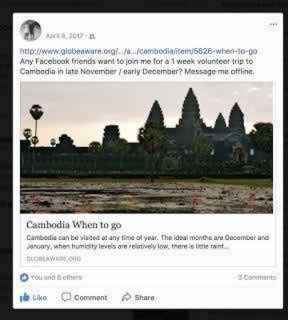
Have fun! Help People! Teaching in Cambodia
- Source: Globe Aware
It all started with a Facebook post. 'Anybody want to join me for a 1-week volunteer trip to Cambodia...?' Well, sure I do! And thus began a life-changing adventure!
On the Wednesday night before Thanksgiving, despite the holiday madness, my friend Mira Wooten was gracious enough to drive me up to SFO. There I met my friend and co-pilot on this adventure, Kyle. Kyle and I have been friends for almost 30 years. He and his husband travel extensively and often ask for friends to join them. I always wanted to say yes and the time was finally right!
At 5 minutes after midnight, while turkeys were defrosting all across the US, our Singapore Airlines flight took off for Cambodia, by way of Hong Kong, and Singapore. We arrived in Siem Reap, Cambodia around 10 o'clock in the morning on Friday and were met by our Global Aware coordinator, Alin. Globe Aware, a nonprofit 501 (c) (3) develops short-term volunteer programs in international environments that encourage people to immerse themselves in a unique way of giving back. Alin introduced us to our tuk-tuk driver, Mr. Raht. We were delivered safely to our guest house where we checked-in and freshened up from the 24 hours of travel. We spent Friday through Sunday sightseeing with an extremely knowledgeable and somewhat crazy tour guide. He had us trekking the road less traveled as we explored the famed temples of the region. Angkor Wat was of course, breathtaking. Baphuon and Ta Prohm were incredible. But for me, the intricacy and history of Angkor Thom were most compelling. There are 54 four-faced spires, representing Compassion, Sympathy, Charity, and Equanimity which watched serely over the out across the provinces of King Jayavarman VII's empire. We could all benefit from those faces reminding us!
On Sunday we also stopped by to check out the school where we'd be volunteering that week. Even though it was a Sunday there were about 30 children, aged 2-18 waiting to meet their new teachers. It was exciting and humbling to see the school. The classroom is about 8 rows of benches and tables, under an overhang off of the mother's house. There is a dirt floor and wooden benches with old school posters hanging on the wall of the house and a whiteboard on one end.
In Siem Reap, students attend government school only half a day. During the Khmer Rouge, dictator Pol Pot, in an attempt to socially engineer a classless communist society, destroyed all of the schools and killed or imprisoned most teachers. The impact of this remains 40 years later. Due to a lack of resources and minimum government funding for schools, there is a shortage of teaching material and school facilities. Teachers, like those in this county but with a bigger detriment, are underpaid. Children that live where there are private schools and have the financial resources to attend, go to private school or tutoring for the other 'half' of their day. These schools are usually taught in English, so students are learning English along with additional content. In the poorer villages outside the city, no such options exist.
A few years ago, a mother in the village decided to start an English school for the village children. GlobalAware became aware of the school and decided to bring in volunteers. Which is how Kyle and I ended up in the small village outside Siem Reap.
Sunday night, Kyle, the planner, sat us down to plan out what we would teach. We'd been given the primer they were using at the school, but the teacher in me just couldn't use it. We talked about what vocabulary would be most useful to these children and tried to focus on that. So time of day, days of the week, greetings and such were our starting vocabulary. WIn addition, we ended up covering colors, shapes, body parts (head, shoulders, knees and toes) and we also did some lessons in hygiene.
Monday morning arrived and Kyle and I were excited to work with the children. We had hoped to be able to break them up into smaller groups, but since we only had one interpreter, we decided that would be too hard. We started in with greetings and "hello my name is...." It was so challenging working with an interpreter, but it made us really thoughtful and reflective on word choice. We made it through the morning session and Mr. Raht, took us back to our lodging, where we freshened up a bit. I asked our manager there where to get school supplies. Since her children were home for their midday break, she volunteered her kids walk us to the school supply store to pick up art supplies. Everywhere we went during the week, people were just so nice! After the store (where I resisted the urge to buy everything I could carry) we had a tasty lunch before heading back to school for the afternoon group. Several students were there for both morning and afternoon. We covered much of the same material and tweaked our lessons a bit for the slightly older group of students. Many of the morning children were there for all or part of the afternoon sessions. One of the little guys in the front row fell asleep in the afternoon. His friends tried to wake him, to no avail. I told them to let him sleep...learning is hard work! They were all so eager to learn. It was hot, dirty and hard work, but the hugs and smiles made it all worthwhile.
While I was away, I posted some about our experience on Facebook. One comment by my friend and former colleague struck home:
MK As I stand in front of my highly privileged students who are generally so unappreciative of what they have and what others do for them, I think of the students you are teaching who are at the other end of the “privilege” spectrum, and get such joy from simple things and those who try to help them. I think I would take your students over mine any day.
Sandra: It is incredibly humbling, MK. One of my Bagby friends posted a pic of their lost and found rack. These children would be so grateful for a second or third shirt, much less so many clothes that you can ‘lose’ some. Perspective.
Monday after school we stopped by the lumber yard to order supplies to repair Grandmother's home, which had been damaged in the rainy season's storms. Tuesday we worked with shapes and colors and names of everyday objects. We had to remember that in Cambodia, everyday objects were not the same as in the States. Every evening, after a shower and a nap, Kyle and I would meet to plan out the next day, before venturing into the city for dinner. The days flew by so quickly. The students were so proud of their work and even Mr. Raht, knowing the value of speaking English in a country whose economy was fueled by tourism, participated in all the lessons.
In addition to teaching, we built and installed two walls for Grandmother's home and also built a wheelchair. Another Khmer Rouge remnant in Cambodia is landmines. Cambodia is one of the most heavily mined areas in the world; some estimates run as high as ten million mines (in a country of 11.5 million people), though the Cambodian Mine Action Center (CMAC) estimates 4 to 6 million mines. These mines came from many places, likely including the USA. Partnering with Free WheelChair Mission, Global Aware provides the parts to assemble an easy to build, rugged wheelchair made from bicycle tires, plastic lawn chairs, and a welded frame. For $80, a wheelchair can be built, shipped, and delivered throughout the world, giving landmine survivors mobility, independence, and dignity. We were able to get parts for one while we were there and assembled it on Thursday, but were unable to connect with its recipient while we were there.
Friday came too soon and we said goodbye to our students. I am already trying to figure out how I can come back and teach for a longer period of time. Being with these kids, feeling their desire to learn and understanding the value of an education in a third world country really reignited my passion for teaching.

Volunteering for One Week in Peru with Globe Aware
- Source: The Wandering Class
Service, Sights, and Rainbows!
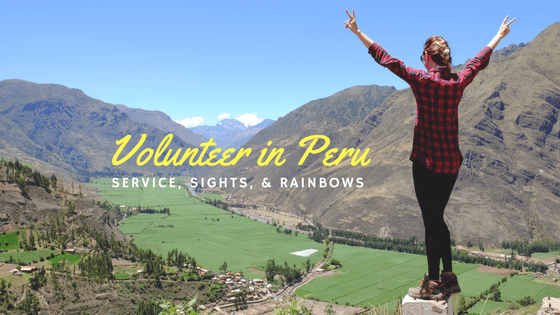 Many of you have shown interest and asked what it's like to spend a week of your vacation time volunteering abroad. We want to devote this post to showing you how a week of volunteering abroad can bring you so close to one country while giving back and simply...traveling.
Many of you have shown interest and asked what it's like to spend a week of your vacation time volunteering abroad. We want to devote this post to showing you how a week of volunteering abroad can bring you so close to one country while giving back and simply...traveling.
We traveled with GlobeAware who organizes volunteer vacations which are typically one week; they are structured to give you time getting to know the community, work on various service project, spend time with locals, and of course see the surroundings like a tourist all in 7 days.
You heard us right, SEVEN days only! That still sounds too long? I did this over Thanksgiving week and only took 3 vacation days, yep, that's not a lot and I'm sure you can skip one year of Turkey. Your family will forgive you.
Here's a taste of the Cuzco program day by day.
Day 1 - Arrive in Cuzco!
Arrive early AM. Have a light breakfast, take a nap until the afternoon to catch up on unslept hours in the air.
We didn't think we were hungry yet but boy were we in for our first surprise - the incredible lunches! Lunches seemed to be the larger meal of the day, usually starting with a delicious rice soup and today we experienced quinoa crusted chicken! It's as delicious as it sounds - crispy & tender - why don't we have this?
After Lunch, Rosio our wonderful host, takes us through a walk through Cuzco city. I had no expectations of the city but the pure romance of it really captivated me. There were cafe's, restaurants, pubs, and shops with beautiful local artifacts.
Don't be surprised to see locals dressed in native bright dress walking with dressed Alpacas. Selfies are welcome for a small tip!
Quick Tip: Don't rely on debit cards to withdraw local cash - bring some cash to exchange in case the ATM's don't work!
Day 2 - Touring Cuzco and the Sacred Valley
Yes! Another chance to see Peru: we were taken on a full day tour of the Sacred Valley. The trip included an overlook over Cuzco, Sacred Valley, Pisac Market, Salt Mines, and other stops.
Couldn't help but pull over and take in the Sacred Valley Views.
Day 3 - First Work Day
We've done so much so far, time to work!
One of our big projects included helping with painting the outside of the Alberque and building brand new bunk beds.
The House, or referred to al Alberque, also translates into Hostel, hosts kids that live in rural areas during the school week. The kids need to attend secondary school which is not primarily available in villages outside of Cuzco so their parents send them to the city during the week to live and attend school. Secondary school is highly valued in Peru and families will do whatever it takes to send their kids to continue their education. The Alberque hosting program is not readily available to any kids and due to lack of resources can only host a handful of kids at once.
The GlobeAware volunteers play a big role in sustaining the hosting program for these kids so they can continue their education.
We spent the day prepping the outside for painting and began painting.
As mentioned earlier, the lunches were something to look forward to.
Each afternoon after lunch we got the chance to take a rest or nap. Working in high altitude could tire you out if you're not acclimated. Then back to work until about 5:30 pm each day.
Dinner is also meticulously prepared for the volunteers; always a delicious surprise!
Day 4 - Work Day
We spend Day 4 in a similar manner: paint, lunch, nap, paint, dinner, and activity with the kids.
It was important for us to spend time with the kids at the Alberque, each night we were to create an activity for the group - we opted for Yoga! The kids were excited, loved the poses, and actually tuned into meditation. Try to get 20 teens to stay quiet an still for 10 minutes - it was miraculous!
My friend and co-volunteer Cassie inspired her team at Michigan Office Solutions and one of her clients to donate brand new clothes, tooth brushes & shoes to the kids staying at the Alberque.
One of our activities was to talk about dental health and the importance of brushing your teeth the correct way.
Finished painted building.. we got some help but it was a HUGE project complete! Also there are like 7 sides to the building!
Day 4 - Macchu Picchu
YAY!
This was our free day and of course we spent it exploring the World Heritage Site - Macchu Picchu.
This Cuzco program really allows you to experience Peru as a tourist and a local. With two and a half days of available excursions and tours you feel like you're still traveling while providing value to the local community.
Day 5 - Work Day Village
In the morning we picked up some fruit for the kids at a local market. I could have spent hours at this market eating, taking photos, and just taking in the local life.
Once we arrived at the village outside of Cuzco, with our bare hands & feet we created clay and put together a stove for a kindergarden class.
After lunch we helped with the construction of a large community greenhouse.
The volunteer program does require a donation which varies depending on where you go. The donation you bring goes toward materials used in the projects and the community you service. We were excited to see that this community could have a green house to continue growing fruits and veggies for their families.
It's just as interesting interacting with the kids, watching women dig & plant potatoes, and living life in this moment.
Just as we were about to leave, one of the families of the village wanted to treat us to a special dinner. They knew it was a special holiday for us (Thanksgiving Day) so they prepared something special for us:
Guinea Pig and Potatoes.
Tastes like chicken.
Day 6 - Last Work Day Building Beds
Because of previous volunteers, the Alberque was able to purchase materials, mattresses, and build brand new bunk beds for all of the kids. Us volunteers spent the day taking apart old bunk beds, putting together brand new ones, and furnishing them with fresh mattresses and pillows. By the end of the day we had put together 11 bunk beds for the girls section of the home. They were so excited!
some of the old bunk beds we took apart
On the last day the kids put on a huge dancing and singing production for the volunteers. It was a nice farewell!
2 AM - Leave for Rainbow Mountain.
Seven Day Adventure in Peru Complete.
Do we recommend it?
Absolutely.
Why?
- The week is very organized
- Projects vary from day to day
- The food is plentiful, home cooked, and delicious
- The host (Rosio) makes you feel welcome and part of her family
- You get to see Sacred Valley and Macchu Picchu (can't go wrong there!)
- You feel fulfilled with the work and relationship you made with Cuzco, Peru, and the community
- How can you get involved?
Go to Globe Aware (http://www.globeaware.org) and sign up for this or one of their other great programs.
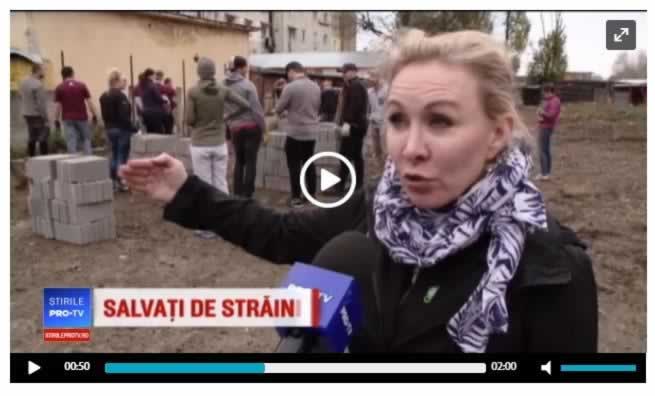
Globe Aware assists Romanian families dealing with Down Syndrome
- Source: Self
The Center for People with Autism and Down Syndrome is to be set up in a former kindergarten through the help of volunteer groups such as Globe Aware. The building was made available by the City of Prejmer, and the money for building materials and labour came from US foundations and volunteers.
Once the project is completed, there will be therapy rooms, a dining room and 10 ensuite rooms.
Gabriela Plopeanu, a mother of two children suffering from autism, felt Romanian authorities did nothing to assist families or individuals dealing with autism. The new centre was inspired by similiar programs in Australia, England and the Netherlands, where adults with autism lead a decent life in residential centers and are not placed in psychiatric hospitals, as is often the case in Romania.
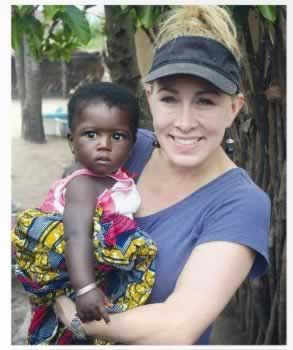
Meet Kimberly Haley-Coleman of Globe Aware in Lakewood
- Source: Voyage Dallas
Voyage Dallas October 4, 2017
Today we’d like to introduce you to Kimberly Haley-Coleman.
Kimberly, let’s start with your story. We’d love to hear how you got started and how the journey has been so far.
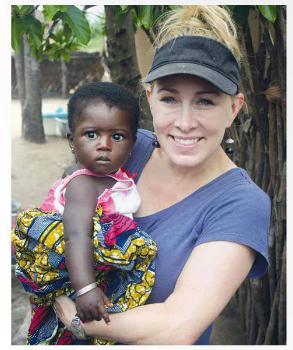 I was raised with a deep love for different cultures. Before I got an MBA in international business, I got my masters in Art History (here at SMU). After working for a few nonprofits, I ended up in the for profit world doing business for multinational corporations. I found myself often traveling to developing countries where I sought to volunteer. I found that organizations just didn’t want short term volunteers, as the time and energy to train someone wasn’t worth it if the volunteer couldn’t commit a significant chunk of time, usually a minimum of a few weeks.
I was raised with a deep love for different cultures. Before I got an MBA in international business, I got my masters in Art History (here at SMU). After working for a few nonprofits, I ended up in the for profit world doing business for multinational corporations. I found myself often traveling to developing countries where I sought to volunteer. I found that organizations just didn’t want short term volunteers, as the time and energy to train someone wasn’t worth it if the volunteer couldn’t commit a significant chunk of time, usually a minimum of a few weeks.
Since 1990 Ms. Haley-Coleman has been establishing long-term strategic partnerships and projects in non-profit and for-profit international arenas. Prior to founding Globe Aware, she was Vice President of Business Development for an aerospace company, Space Services International. Previously she led Business Development for Infotriever, which facilitated global contacts. As the Director of International Business Development at Investools, she created strategic international relationships and developed a globalization strategy to give free financial education tools to millions. During launch of CNBC.com, was Product Manager, managed and supervised product development efforts and trained on-air staff in using online stock evaluation tools. She developed and patented Dcipher, an artificial intelligence engine for free, real-time analysis of stocks and portfolios which helped provide investment analysis for those who could not afford financial advisors. At FCA, she created international joint ventures for small companies to develop sustainability of West African markets. Certified with Series 7, 65 and 63 licenses, she spent 2 years as Associate Portfolio Manager of the closed-end Capstone Japan Fund, she researched international stocks, made investment picks and placed trades. At Documentary Arts and Contemporary Culture, two Dallas-based non-profit organizations, she served as Associate Director of Programs, where she organized programs, wrote grants; prior nonprofit work includes internships at Dallas Museum of Art and High Museum of Art in Atlanta, Georgia. She squeezed in volunteering while traveling internationally on business and consulted with various international NGOs on achieving their goals.
Frustrated by the difficulty to give time effectively in needy communities within confines of busy life, she began Globe Aware to give Westerners a forum to serve in a meaningful and fun way for both the recipient communities and the volunteer. She wants Globe Aware to serve as a lamp to light that flame of inspiration in people who might otherwise have very little time to give abroad. She has an MBA in International Business from UD, grad with Highest Honors, received Texas Business Hall of Fame Scholarship Award, has an MA from Southern Methodist University and a BA from Emory University.
She is currently serving as Chair on the Executive Board of IVPA (International Volunteer Programs Association), on Dallas Opera Board of Trustees, on Board of Groundwork Dallas, is President of Dallas’ Shore Acres Beautification and is Leadership Member for Service Nation.
Overall, has it been relatively smooth? If not, what were some of the struggles along the way?
The problem is that most Americans with jobs simply don’t have that kind of time (weeks or months) to give. And yet they are frequently in a position where not only can they give more financially, but their souls actually need that meaningful interaction, perhaps even more than those who have flexible schedules. It can be such a grey, dog-eat-dog world. To get out of it, to stand side by side as equals helping people one projects that are important to them, that’s something that can bring new meaning and color and even appreciation to life.
Also 2008 was a bumpy year for sure. Expenditures on travel and donations are often the first areas cut so we, like most nonprofits, took a huge hit 2008 to 2009.
“I think it’s critical that in order to be a really involved, successful person, I feel it almost requires that one be a globally aware citizen. It helps find resolutions, on a global scale, to conflicts that are important, whether it’s political peace or bringing groups and different nationalities together to find a solution to problems that we all face,” Haley-Coleman said, “But it’s also a huge source of joy for someone for their whole life, to have those wonderful moments of cultural understanding.”
Please tell us about Globe Aware.
Short term, one week volunteer vacations in 20 countries around the world. Volunteers typically work about 35 hours a week, but they also have cultural activities scheduled and free time. The cost of the program and the airfare is 100% tax deductible against the participant’s income.
Specializing in well organized, short-term abroad volunteer opportunities. We usually focus on concrete projects. As examples, we assemble wheelchairs for landmine victims in Cambodia, install concrete floors in the homes of single moms in Guatemala, build adobe stoves in Peru, etc.
What sets us apart? That our volunteers typically feel they have received much more than they have given, because this generally inspires them to do even more and to stay engaged. When we know we are making a difference, it not only helps others but clearly improves our own sense of well-being. What better win-win is there than that?
How are we different? People calling us will not confront a voice mail tree or unanswered emails. We are committed to human interaction. We let locals decide which projects they need. We allow families of all ages to participate. Also, this isn’t just fulfilling. It is outright fun. If it isn’t fun, we aren’t doing our job. Our motto is, “Have Fun, Help People”
Also, most of our peers don’t believe in contributing financially to project work, seeing that as a way to increase reliance on outsiders. We take a different approach. If you spend money on wheelchairs and give them to people who need them, this increases their self-independence. We engage in projects that the locals have asked for, do them in a way they decide upon, we don’t choose projects involving heavy equipment or machinery or high on ladders, don’t handle bodily fluids or require certain skills.
Doctors Without Borders is a great organization, for example, if you’re wanting to do surgery. That’s not our forte!
Every organization is different. Ours are specifically geared toward those without specific work or language skills who have *very little free time*. Our most often call is someone who knows they want to volunteer but have no idea where. We spend a fair amount of time assessing how much travel they’ve done before. For example, if they’ve never left the country, we generally think its huge amount of culture shock to go straight to India or Cambodia, for example, and we might recommend Costa Rica, as its culture isn’t quite as drastically different from North America. If they have traveled and they speak another language, such as Spanish, we might steer them to a country like Peru. See its very much based on the specific volunteers past service, travel, and languages. Oddly not many people decide where to go based on what TYPE of service is offered. For example, we assemble wheelchairs for landmine victims in Cambodia. I really don’t think that the service itself is ever a deciding factor, and really that’s ok. There is REAL NEED everywhere. Start with your interest, inclination, and perhaps any culture you have personal connection to.
Globe Aware has just launched a 3-part initiative in an effort to aid the post-earthquake Mexico reconstruction effort in the villages of Hueyapan, Zaucalpan, Tetela del Norte, Jojutla and Yautepec, as well as their main program location, Tepoztlan.
The organization has a deep connection with Mexico, and recognizes that these smaller communities are not receiving the help they need. The organization immediately connected with program coordinators and began relief aid by coordinating the delivery of supplies for assistance in these areas.Globe Aware has now begun work directly with families in those locations in rebuilding their homes, prioritizing building homes for those with single mothers and young children, as well as the elderly. Volunteers who register for the Globe Aware Mexico volunteer vacation program will have the opportunity to be a part of these critical reconstruction efforts. Haley-Coleman, stated that “In a world where many of us may feel helpless in the face of seemingly constant manmade and natural disasters, this kind of effort means not only getting much needed supplies and housing directly to those who most need it, but also allows our hearts to heal as we participate in the mending.”
Has luck played a meaningful role in your life and business?
Yes, luck played a part. We were fortunate to come up at a time when there is a generally growing sense of social consciousness that has allowed us to succeed. Also, our volunteer demographic happens to coincide with an attractive ad demographic for a lot of mainstream media, so we have been the fortunate beneficiary of being the subject of their stories and segments. If you had to go back in time and start over, would you have done anything differently?
It certainly would have been easier if I started earlier before having children, but I think things work out the way they do for a reason.
Janet Robinson, a recently returned mother who volunteered in Cuba says “I think my children learned what you really need to be happy. I think we learned about material possessions and what people, in general, need to be happy, because we saw people who didn’t have anything who were having happy and wonderful lives.”
Pricing:
Programs cost about $1000 to $1500 a week and include food, accommodations, bottled water, project materials, medical insurance, bilingual coorindator, in-country transportation, etc and are fully tax deductible against your income.
Contact Info:
- Address: 6500 East Mockingbird Lane Suite 104 Dallas, Texas 75214
- Website: www.globeaware.org
- Phone: 877-588-4562
- Email: office@globeaware.com
- Instagram: https://www.instagram.com/globeaware/
- Facebook: https://www.facebook.com/globeaware/
- Twitter: https://twitter.com/GlobeAware
- Other: https://www.pinterest.com/GlobeAware/
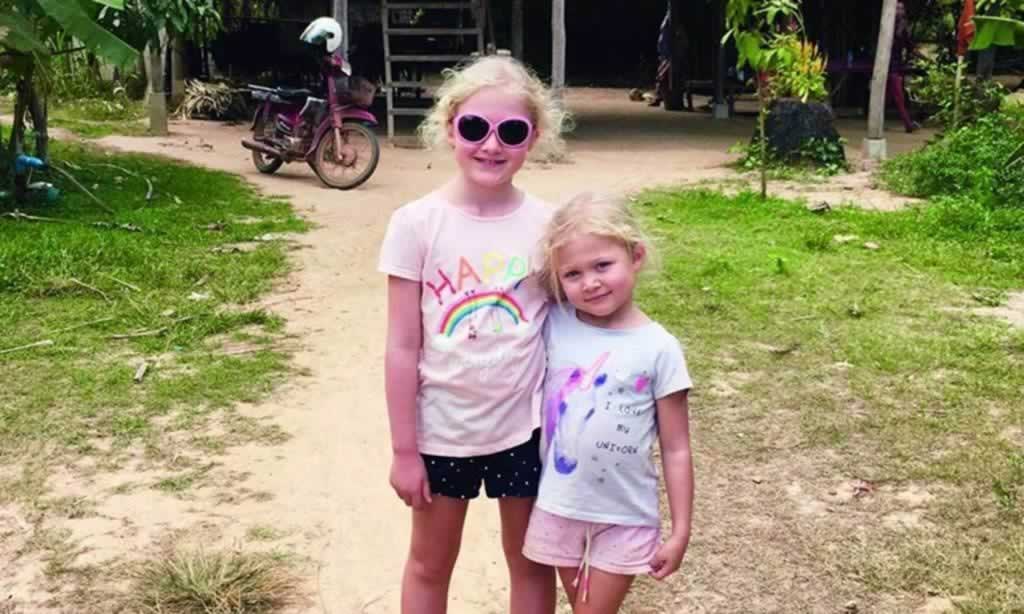
Make a difference with your family on a volunteer vacation
- Source: Time Out Dubai
Family volunteering holidays
Is your family ready to really make a difference on your next overseas trip?
By Carolyne Allmark
April 2, 2017
Nobody wants to raise spoiled, entitled kids with no sense of empathy, or any idea of how lucky they are to live a life revolving around happy school days, a lovely home and – if you’re living here in the UAE – world travel at their finger tips. And it’s exactly this desire to travel and immerse in another culture that’s presenting families with the most exciting, and potentially life-changing, opportunity to do something really useful – and to give back – with their next holiday.
Globe Aware is a non-profit organisation that plans volunteer vacations for families around the world, helping to rebuild remote communities, install clean water sources, repair roads and teach languages in some of the poorest villages, towns and cities on earth. This means children experiencing these holidays are exposed to global issues they might only learn about in the classroom.
“Few opportunities in life offer the ability to experience another culture at the same time as serving in a meaningful way and we have definitely seen an increase in young families taking volunteer vacations,” says Globe Aware’s director of communications Shanti Shahani. “We are becoming more adventurous in our travel as parents, and many families are recognising how important it is for our children to be compassionate global citizens, to appreciate their surroundings and develop an interest in helping those around them. Words and values like tolerance, inclusivity, diversity and kindness are more important now than they have been before in our generation.”
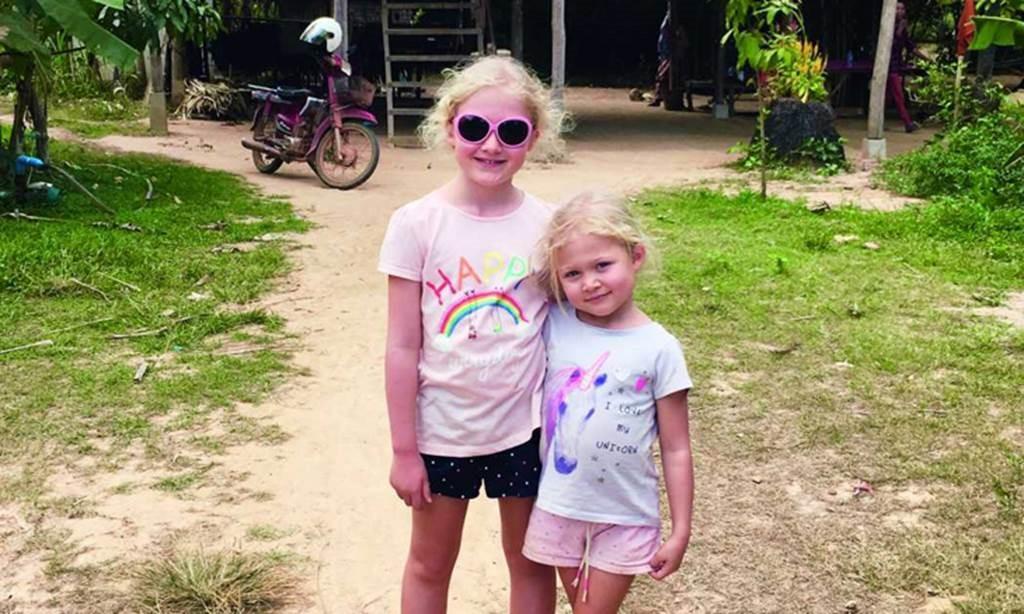 Trips vary, depending on which provider you choose, but Globe Aware cites one week as the perfect length of time for families to volunteer. It also gives you the option to enjoy travelling and sightseeing at your chosen destination. Once you’ve decided where you’d like to go, they’ll put together an itinerary – including accommodation, guides and transfers – based around the ages of your children and the kinds of activities you’d like to get involved in, or the skills you think you can offer.
Trips vary, depending on which provider you choose, but Globe Aware cites one week as the perfect length of time for families to volunteer. It also gives you the option to enjoy travelling and sightseeing at your chosen destination. Once you’ve decided where you’d like to go, they’ll put together an itinerary – including accommodation, guides and transfers – based around the ages of your children and the kinds of activities you’d like to get involved in, or the skills you think you can offer.
“Projects are adapted to volunteers and we always make a point of explaining to children why what they are doing is important,” Shahani explains. “We make sure the activities are safe and interesting, so a child may be able to help plant a tree, and they can also provide unparalleled help in teaching English as a Second Language through songs and games to kids their own age.
“This language instruction also provides future job opportunities for children in the communities Globe Aware serves,” says Shahani.
One Dubai-based family recently travelled to Siem Reap in Cambodia to visit friends who had moved there for a family gap year. Before they left, they launched a campaign at their school in Dubai Sports City, asking parents to donate toothbrushes and toothpaste for a local village school. Mum Louise Reynolds explains: “When we travel, we like to take the opportunity to teach Alula and Lana [her children] about other cultures and ways of living, hopefully instilling a bit of empathy and the desire to help others when possible.
“In Sri Lanka we took tuk-tuks into poor communities so that the girls could give pencils, notebooks and soft toys to children and were invited into a lovely family’s home as a thank you,” Reynolds recounts. “It was good for the girls to see that, although the family really had nothing, they were more than willing to share what they had with us.”The Reynolds family visited the Kompheim Community School, run by local non-governmental organisation Husk, which provides English language lessons to village children, who earn “Husk dollars” for attending the school. They can then spend those “dollars” at the school shop, where the toothbrushes and toothpaste were donated. Education is recognised as a major key in breaking the poverty cycle for future generations and, sadly, less than 30 percent of Cambodian children will complete primary school, meaning that encouraging this attendance is key.
“We saw a few schools while we were there and the girls seemed quite surprised that the government school didn’t have four walls and really was just a bit of a shack. They wondered what would happen to the kids and their work if it rained!”
Overall, however, the family really enjoyed their time in Cambodia. “But, probably the biggest thing they’ve come away with is the absolute shock that people over there fry and eat bugs. I tried bribery, but they were adamant they weren’t going to sample any!” laughs Reynolds, who also tells us she’s already looking into their next volunteer trip, helping to rebuild schools in Kathmandu, Nepal, which were destroyed after the 2015 earthquake.
Aside from India and the Far East, other popular locations for volunteer travel are Costa Rica, Mexico and Guatemala. But researching before you book is crucial, as Shahani points out. “Make sure you go with a registered non-profit organisation so there’s transparency about exactly how your money will be spent. Ask if they are a member of the International Volunteer Programs Association and talk to past volunteers.”
It’s also important to remember that projects shouldn’t take work away from local people and should be fulfilling a genuine need in a community. And families with young children should think about the overall travel time to get to their chosen destination and ensure they have all the relevant vaccinations.
“I would say there is no better way to truly immerse yourself than to work alongside members of the community as equals, in projects that are important to them, to be able to truly appreciate the beauties and challenges of another culture,” Shahani adds.
“No other tourist experience can truly provide that and being able to experience that with your family is an opportunity comparable to none.”
What are you waiting for? It’s time to start collecting those dirhams (for others).
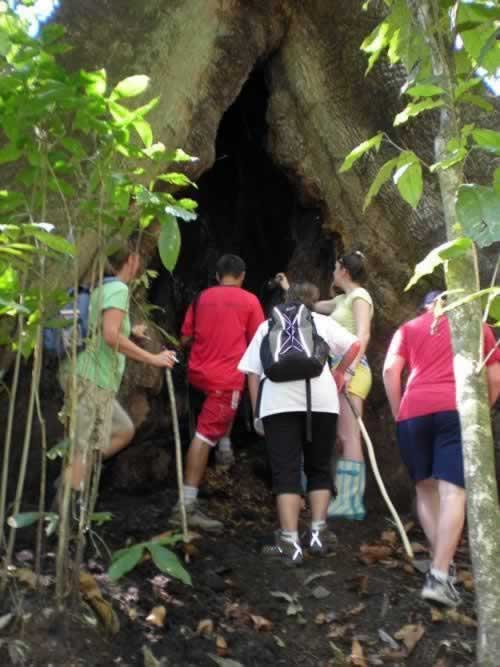
Globe Aware named one of top eco-travel providers
- Source: Greenmatch
Globe Aware named a Top Eco-Travel provider for 2017
In its annual list, GreenMatch, an online service which provides you with quotes for green energy products from multiple providers, identifies sustainable and environmentally-friendly ways of travelling and recognizes Globe Aware for the work done in many countries around the world:
"Traveling is an exciting and eye-opening adventure that many individuals and organisations like to partake in. However, many travelers are unaware of the carbon footprints that they leave behind when they visit, and that can be harmful to these communities and countries.
Fortunately, as environmental awareness and engagement gain popularity, there are a growing number of individuals and organisations that travel sustainably. This means that they are engaging in ecotourism activities, giving back to the environment in community projects, reducing their overall carbon footprint and much more!
After extensive research by the GreenMatch Team, we have nominated and selected the Top Eco-Traveling Enthusiasts of 2017."
Globe Aware is recognized for "Sustainable Voluntourism"
Learn more here
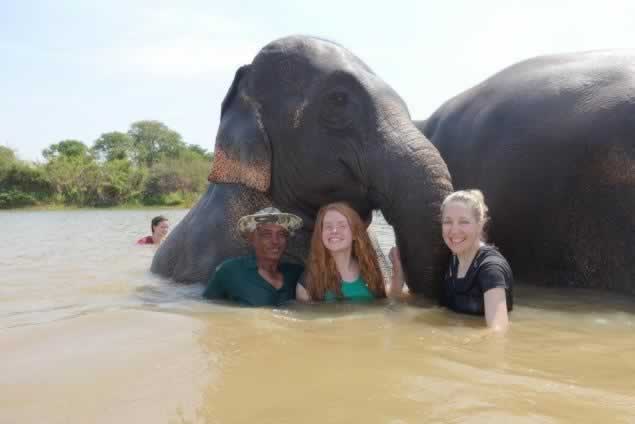
Volunteer in Thailand with Globe Aware
- Source: University at Buffalo
Kris Depowski O'Donnell
Kris is an education and communications professional, teaching at the University at Buffalo and working as a field producer providing medical reports to more than 100 television stations around the country. She loves making a difference through international volunteer work.
Why did you choose this program?
Globe Aware offered a program that helps better the lives of captive Asian elephants. With this program, unlike some others in Thailand, the elephants' welfare is front and center at all times.
What did your program provider assist you with, and what did you have to organize on your own?
Globe Aware provided detailed descriptions of the project and outlined what volunteers should expect and bring with them to Thailand. They suggested hotels for me in Bangkok that were close to the meet up point and assisted with a reservation that I had an issue with. I took care of finding a hotel near the airport (flights from the U.S. almost always land around midnight and depart in the early morning hours).
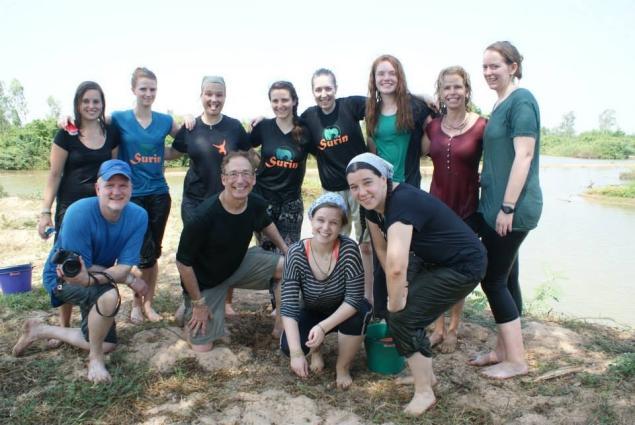 What is one piece of advice you'd give to someone going on your program?
What is one piece of advice you'd give to someone going on your program?
For this particular program, there wasn't much I didn't already know prior to arriving in Thailand because Globe Aware prepared me so well and I did a lot of research on my own as well. For friends who are thinking of going abroad I tell them GO! You will never regret it as long as you have an open mind, a sense of adventure (and humor) and love learning new things.
What does an average day/week look like as a participant of this program?
The days at Surin Project are well-coordinated. Everyone has breakfast together around 7 am. The food is freshly prepared and delicious. I'm vegan and they could easily accommodate my needs. We then have a work project for about an hour or so, which includes cleaning enclosures and chopping sugar cane. Then we walk the elephants in the forest for an hour or so. Then there's a break for lunch at a local eatery, then an afternoon work project followed by another walk in the forest where the elephants get to hang out with their friends and enjoy being elephants. We end the day by having dinner together. On two of the days, we walk the elephants to the river to bathe them, one of the highlights of the experience.
Going into your experience abroad, what was your biggest fear, and how did you overcome it and/or how did your views on the issue change?
I have traveled extensively through Europe, mainly on my own, so my fears were relatively limited. I think the biggest reservation I had was that I had never been to Asia (and was traveling on my own). I was also traveling to a very remote part of Thailand to work in a village with no air-conditioning, indoor plumbing, showers or hot water.
The way I overcame the fear is by reading as much information as I could ahead of time about what to expect and making sure I had the proper travel shots, medication, etc. Knowledge is power.
Is there anything else you'd like to share with prospective volunteers?
There is one important thing to know and it's something I've been asked about. Travelers should educate themselves about the plight of captive elephants in Thailand. It is a sobering and complicated issue. Elephants in Surin Project are allowed off chains for at least 5 hours a day and mahouts are not allowed to use the bullhook. But the Project exists alongside elephants who are used for the local circus. These elephants are chained 24 hours a day (when they are not performing), sometimes by all four feet.
It's difficult emotionally at times to see them in these conditions but I remind myself (and tell prospective volunteers) that it's critical the Project continue to receive support from volunteers. It shows the local people that tourists want to see elephants treated humanely and interacting with each other in a natural environment. I have taken part in Surin Project every year for the last three years so there isn't anything I would have done differently.
I can say that on the first day of my first visit (in 2014) I sat on my bed, on the floor, in 100 degree heat, with only a fan and mosquito netting and thought 'what in the world have I just done!?! I can't survive this!' Fortunately, that feeling lasted less than 24 hours. Then I was hooked. But it was briefly terrifying!
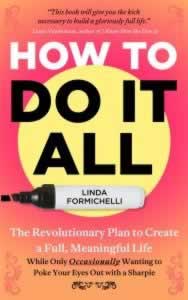
How to Do It All including volunteer vacation
 Writer Linda Formichelli's new book "How to Do It All: The Revolutionary Plan to Create a Full, Meaningful Life — While Only Occasionally Wanting to Poke Your Eyes Out With a Sharpie" has a chapter on volunteering and features Globe Aware as one of the resources.
Writer Linda Formichelli's new book "How to Do It All: The Revolutionary Plan to Create a Full, Meaningful Life — While Only Occasionally Wanting to Poke Your Eyes Out With a Sharpie" has a chapter on volunteering and features Globe Aware as one of the resources.
Formichelli considers the fact women want to do, see, and experience everything they can to create a rich, memorable life, including rraveling, volunteer work, athletic events, entertaining, reading, learning, and trying new things but life and responsibilities get in the way.
She offers a plan on how to do it all:
- Why stress should be welcomed, not avoided.
- The importance of living a do-it-all life.
- Why you shouldn’t expect support from your family…and where to get it instead.
- Why you should shower less, sleep less, talk to yourself, and be inconsistent — and how this can help you live a more memorable life.
- How you can get it all done even when right now you have no time, no money, and no motivation.
- The revolutionary plan to accomplish everything you dream of doing in your life (includes free worksheets!).
Voluntourism comes to Cuba via Dallas
- Source: Lakewood Advocate
Globetrotter Kimberly Haley-Coleman takes East Dallasites around the world
By Brittany Nunn
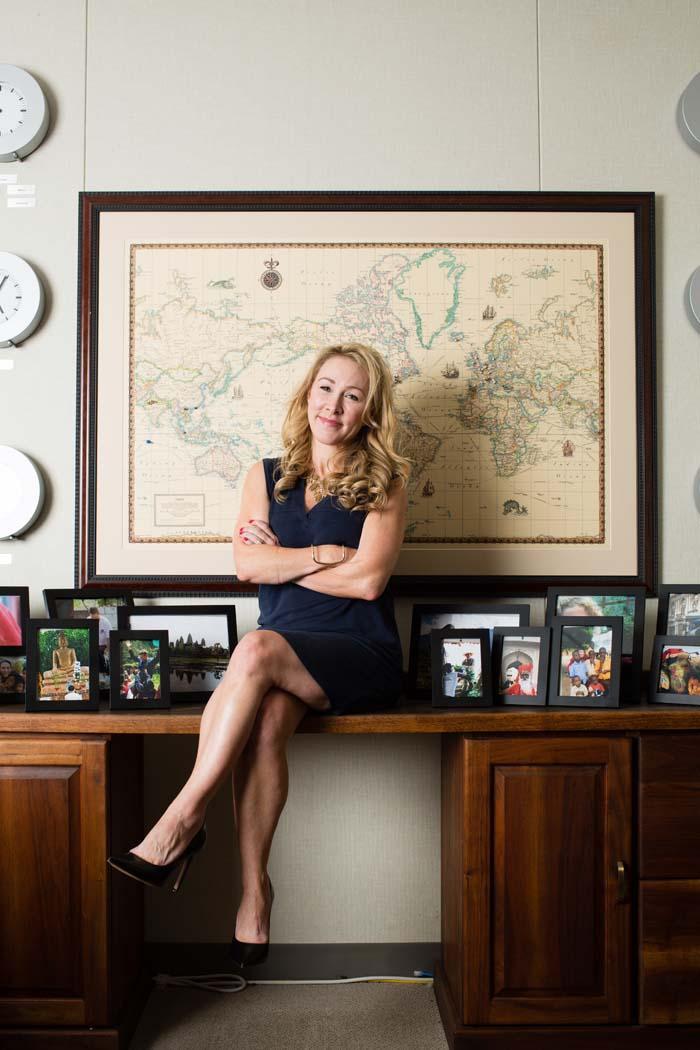 As the Obama administration eases travel restrictions to the long-exiled island of Cuba, millions of Americans are preparing to flock there in the upcoming years. Among those celebrating is Kimberly Haley-Coleman.
As the Obama administration eases travel restrictions to the long-exiled island of Cuba, millions of Americans are preparing to flock there in the upcoming years. Among those celebrating is Kimberly Haley-Coleman.
Haley-Coleman, a multigenerational Lakewood resident, is the founder and director of Globe Aware, an organization that takes groups to countries for short-term, volunteer-centric trips.
It’s “voluntourism” at its best, taking people into 17 countries from Costa Rica to Cambodia, and Haley-Coleman is especially excited to add Cuba to her list.
Since the ’50s, when tension between the United States and communism reached its Cold War boiling point, Americans largely have been banned from traveling to the island nation, which sits less than 500 miles from U.S. soil. Cubans, conversely, have been banned from purchasing any American products, which has had a chilling effect on its fragile economy. Conflicts have since cooled, and the Obama administration has worked to lift some of the remaining restrictions, especially allowing for freedom of travel.
“Cuba is undergoing huge changes right now,” she says, “And of course, there are people who don’t like it, but Cuba is crumbling, and it has been crumbling since the Cuban Revolution. Well now the restoration process is happening again.”
[widgetkit id=139]
Which is exactly what Haley-Coleman wants to be part of, particularly because she understands the importance of cultural sensitivity. To her, work trips aren’t about going into other countries with an egotistical hero complex; they’re about helping in any way possible, while also giving neighbors an opportunity to immerse themselves in an unfamiliar culture.
“We can learn from each other,” Haley-Coleman says. “It gives us a chance to look at the beauties and the challenges of our own culture compared to the beauties and the challenges of others.”
In the 15 years since Globe Aware was founded, Haley-Coleman’s give-and-take mindset has attracted thousands of East Dallasites to travel with Globe Aware. Each trip is 10 days long and includes a task, such as assembling wheelchairs for landmine victims or helping schoolchildren.
“In Cuba, we’re fixing up playgrounds, working in elderly homes and working in schools,” she says. “We don’t go into places and tell them what they need. We ask them, ‘What is your challenge? How can we help you?’ And those are the projects that we do.”
Interested in participating in a trip to Cuba or another country? Go to globeaware.org.
- See more at: http://lakewood.advocatemag.com/2015/10/23/globetrotter-kimberly-haley-coleman-takes-east-dallasites-around-the-world/#sthash.Sm3czx56.dpuf
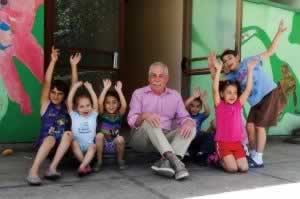
Difference Maker
- Source: The Christian Science Monitor
Ian Tilling, a retired British policeman, went to Romania to help children in need. His nonprofit Casa Ioana is a place where women and children can go to feel safe and learn how to rebuild their lives. Ian was so inspired and pleased with the impact and success of his efforts, he never left Romania. Here is his story from the The Christian Science Monitor.
World People Making a Difference
By Kit Gillet, Correspondent
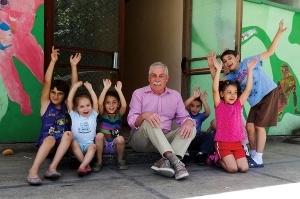 Bucharest, Romania — It’s been a journey to Romania of a quarter-century-and-counting for Ian Tilling. During that time he has been instrumental in setting up long-term shelters in Bucharest, the capital, initially for orphans, later for the homeless, and later still for families suffering from domestic abuse.
Bucharest, Romania — It’s been a journey to Romania of a quarter-century-and-counting for Ian Tilling. During that time he has been instrumental in setting up long-term shelters in Bucharest, the capital, initially for orphans, later for the homeless, and later still for families suffering from domestic abuse.
Casa Ioana, which he founded 20 years ago, recently opened a second night shelter in Bucharest, where women and children can go to feel safe and start to rebuild their lives. The charity is also about to roll out a series of courses to help recovering women develop job skills.
“Without a job the chances of changing the situation [for these women] is quite remote. The only way out really is through employment,” says Mr. Tilling, sitting in the historic Old Town neighborhood in the heart of downtown Bucharest.
Recommended: 11 quotes from difference makers
Tilling, a retired police detective from England, first came to Romania after seeing disturbing televised images of institutionalized children that were broadcast around the world following the Romanian revolution in December 1989.
“My wife asked me if I had seen the pictures coming out of Romania, the awful images of children languishing in orphanages,” says Tilling, explaining his first glimpse of the country that would come to dominate his life.
Within six weeks he and a British nurse had gathered up supplies and were driving across Europe in a borrowed van filled with donated baby food, diapers, toys, and medicine. They ended up at an orphanage called Plataresti, a “hellhole 40 minutes drive outside Bucharest,” Tilling recalls.
At Plataresti, Tilling was asked to help with a group of twenty 7- to- 9-year-olds who lived together in one room. Their cots were lined up 10 on each wall “like a row of prison cells” and the children never left them, he says. Most were still being bottle fed. The smell was awful. Tilling was tasked with talking with the children and keeping them clean, neither an easy task.
“For the month I was working there I was numb,” he says. Yet during the drive back across the Continent to Britain he decided he must go back to Romania. A little while later he did return, this time with 298 other people and a convoy of 100 trucks with supplies.
At the time of his first visit Tilling had been coming to the end of a long police career and wondering what to do next.
“I joined the police at 16 as a cadet. It was all I knew,” he says. He was living in the south of England with his wife and four children. Then in 1991 his eldest son, just 19, died in a motorbike accident and Tilling’s life fell apart.
In 1992 he took early retirement and moved to Romania to run a British charity he had established to provide lifelong care to some of the children from Plataresti.
“Looking back I was clearly escaping the hurt I felt back home,” he says.
However, rather than helping to heal his pain the project proved to be a nightmare itself, with the Romanian government breaking promises and officials demanding bribes. He was left trying to manage a small apartment block in Ferentari, a district of Bucharest that was fast becoming a ghetto inhabited primarily by desperately poor Roma (commonly called Gypsy) families.
“It was all unraveling, and my personal demons were coming to the front, and I was having to deal with that, too,” Tilling says.
In the winter of 1994-95 he lived with 300 Roma families in a collection of dilapidated apartment buildings. To top it off his marriage was breaking up.
“It was the lowest point in my life, but I was fortunate in that I finished my grieving process,” he says today.
Near the end of that winter friends gathered to urge him to leave, even going so far as collecting money for his plane ticket. But he didn’t want to return to England defeated. Instead he regrouped, creating a new charity – a Romanian one – that would pick up where the British charity had left off.
Casa Ioana was born. Over the next few years it became a halfway house for formerly institutionalized young adults and a resource center that helped local organizations set up a school for children with profound disabilities, as well as a kindergarten for local Roma families.
In 1997 Tilling was approached by the mayor of Bucharest with a request to open a night shelter for homeless men, who had become a growing problem in the city. He eventually agreed after the mayor offered to supply a building to house the shelter.
It opened as an emergency shelter for homeless men. But after a few years Tilling noticed the large number of women who came looking for a place to stay together with their children.
Recognizing that the system was failing these families at a time when they needed to keep together he refocused his efforts. Today, Casa Ioana is the largest provider of temporary shelter for survivors of domestic abuse in Bucharest. “I do what I do out of a profound sense of justice,” he says. “I hate to see people suffering.”
Those who know Tilling say he works day and night. “He is a one-man tornado,” says Nigel Bell, a British expatriate businessman who volunteers his time and expertise to Casa Ioana. “He tries to do everything himself; it is absolutely personal to him.”
Despite having the title of president of Casa Ioana, Tilling is often found painting the walls or cleaning the toilets.
Women and children who arrive at the shelters are left alone for the first few weeks. When they are ready they sit down with members of his team, which includes psychologists working pro bono, to develop a plan for moving forward.
Families can stay for as long as a year but Tilling says the vast majority move on within six to eight months. The women get jobs and are able to afford their own places, he says.
Casa Ioana perpetually faces challenges of space and money. It has room for 20 families and nine single women; last year it had to turn away 200 families. “We simply didn’t have room,” Tilling says.
His charity has a budget of about $100,000 a year; 80 percent of its funding comes from private donors and 20 percent from the Romanian government. It employs six staff members. Tilling himself takes no salary and lives on his British pension.
“Ian keeps us together. He brings people in from outside, and he opens the right doors,” says Monica Breazu, one of the social workers employed at Casa Ioana.
Parts of Romania are very traditional, and domestic abuse is often swept under the rug. Women who break away from abusive relationships and end up at Casa Ioana are likely to have been almost completely reliant financially on their husbands.
“Many haven’t got high school diplomas, and without that they can’t access formal training,” Tilling says. “So we created the opportunity for them to return to school. We give them the equivalent of a minimum salary in order to study.” Casa Ioana is also developing a financial-literacy program and six other courses that cover what employers will be looking for from new hires.
Tilling’s journey has never been easy. In 1998 the first Casa Ioana was ransacked by outsiders; everything was stolen right down to the fixtures and electrical wiring. “There were many occasions when I was close to saying enough is enough,” he says. “I’ve invested so much of myself. The good thing was I literally had nothing to go back to, so that was a good incentive to persevere.”
In 2000 Tilling was honored with an MBE from Queen Elizabeth II, shortly after Prince Charles visited Casa Ioana. Two years later he was awarded Romania’s equivalent.
Tilling knows that eventually he’ll have to pass the responsibility for Casa Ioana along to someone else. But it appears that it isn’t going to be anytime soon.
How to take action
Universal Giving helps people give to and volunteer for top-performing charitable organizations around the world. All the projects are vetted by Universal Giving; 100 percent of each donation goes directly to the listed cause. Below are links to groups that help children worldwide:
- Globe Aware helps people and communities prosper without becoming dependent on outside aid. Take action: Volunteer to work helping the underprivileged in Romania.
- Eastern Congo Initiative works with the people of eastern Congo, where local, community-based approaches are creating a sustainable society. Take action: Support access to education for girls in eastern Congo.
- Half the Sky Foundation enriches the lives of orphans in China, offering loving, family-like care. Every orphaned child should have a caring adult in his or her life. Take action: Help a teen in Half the Sky’s youth services program.
Page 3 of 13
